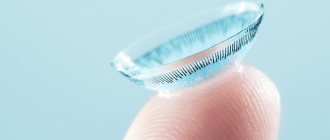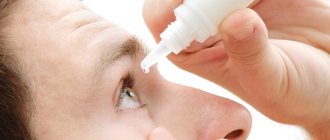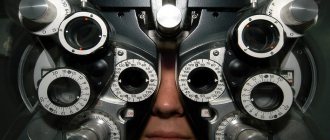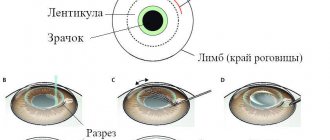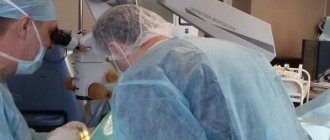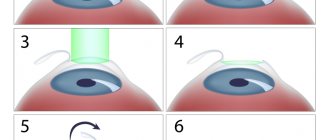Lasik surgery is a minimally invasive vision correction based on changing the refractive power of the cornea using high-precision laser radiation.
Laser correction, like any other eye surgery, ends with a rehabilitation period. For Lasik, its duration is short and usually does not exceed one month.
At the same time, the recommendations given to the patient after laser vision correction are easy to implement. Specialists at the Eye Surgery Center recommend carefully following postoperative instructions: this will help avoid complications.
Recommendations after laser correction
If necessary, the doctor gives the patient special eye drops during the postoperative examination, which must be instilled for a certain period. These are drops with antibacterial properties to prevent the development of infection, and with moisturizing properties for a more comfortable healing process of the cornea.
The drops are instilled until they are completely discontinued by the attending physician, usually 4 times a day, 2 drops of each drug. You need to apply the solution of eye drops into the conjunctival sac, pulling back the lower eyelid and turning your eyes up. It is more convenient to do this lying down, fixing both eyelids.
Any eye medications in the form of drops, gels and ointments used after laser vision correction must be prescribed by the attending physician!
IMPORTANT! After the correction procedure, lacrimation occurs; this is normal and should not cause concern. However, it is worth remembering that you cannot touch your eyes at this moment! It is better to blot tears on the cheek with a sterile napkin or a clean handkerchief. The patient should avoid touching the eyes for 24 hours after the operation .
On the first day after the operation, you can take painkillers and sedatives (2-3 times), if the patient’s condition requires it. It is better to give preference to non-steroidal anti-inflammatory drugs, such as Analgin, Baralgin, Ketorol, etc.
On the first day/night after laser correction, it is better to sleep on your back. When washing your face in the next few days, be sure to control the situation and avoid getting water, soap, or shampoo into your eyes.
Rules for patients (PRK)
Rules of behavior for the Patient in the preoperative and postoperative period after PRK surgery
In order for laser vision correction surgery to be successful, as well as to eliminate as much as possible the possibility of postoperative complications, the Patient must comply with the following basic rules and recommendations set out in this document.
Basic rules of patient behavior when preparing for laser vision correction surgery:
- Before undergoing laser vision correction surgery, the Patient should undergo a complete vision diagnostics, which will allow the doctor to create a complete and reliable picture of the condition of the Patient’s visual system, predict the outcome of the operation, and also assess the risks and possible complications after the operation.
- The patient should stop wearing soft contact lenses 14 days before surgery, unless otherwise prescribed by the doctor.
- The patient should stop wearing hard contact lenses 1 month before surgery, unless otherwise prescribed by the doctor.
- The patient is prohibited from consuming alcoholic beverages at least 48 hours before surgery.
- The patient is prohibited from using drugs at least 2 months before the operation.
- The patient is prohibited from using decorative cosmetics and cosmetics (mascara, eye shadow, powder, etc.) 24 hours before surgery.
- The Patient must comply with all individual doctor’s instructions issued to the Patient for medical reasons.
Basic rules of patient behavior on the day of laser vision correction surgery:
- The patient is prohibited from using decorative cosmetics, as well as eau de toilette and perfume.
- The patient should appear for surgery at the appointed time and place.
- The patient must have with him an identification document, as well as other documents of the availability and necessity of which he was notified.
- The patient should thoroughly wash his face, especially his eyes, and also wash his hair thoroughly, since it will not be possible to wash it for several days.
- The patient is recommended to have sunglasses with him.
Basic rules of patient behavior during the period after laser vision correction
A patient who has undergone laser vision correction surgery must be aware that the rehabilitation period after the operation is on average 6-12 months (unless a different rehabilitation period is established by the doctor), and also that the Patient is required to strictly adhere to the following rules:
- The patient, if necessary, can use sedatives and painkillers after surgery and during the day (1-3 times). You should additionally consult your doctor about the use of such drugs.
- The patient must follow the doctor's individual instructions (for example, place the prescribed drops in the eyes correctly and on time until the doctor cancels them.) If the doctor orders the use of drops, the rules for their use must be followed. Drops should be instilled into the eyes into the lower fornix of the conjunctiva - when looking up, moving the lower eyelids down. The safest way to instill drops into the eyes is by lying down and fixing both eyelids.
Drop instillation mode:
TOBREX 1 drop:
- the first 4 days - 5 times a day. (9.00, 13.00, 17.00, 20.00, 23.00)
- over the next 2 weeks - 4 times a day. (9.00, 13.00, 17.00, 23.00)
OFTAN DEXAMETHASONE (as recommended by a doctor) from the 3rd week:
- 3-4 weeks 4 times a day (at 9.10, 13.10, 17.10, 23.10)
- 5-6 weeks 3 times a day (at 9.10, 17.10, 23.10)
- 7-8 weeks 2 times a day (at 9.10, 23.10)
- 9-12 weeks 1 time per day (at 23.10)
During the entire course of using oftan-dexamethasone, instill arutimol 0.25%, 2 drops at night.
Additionally, artificial tears (natural tears) are usually prescribed 4-5 times a day or SYSTAIN (HILOKOMOD) 3 times a day.
You need to know that dexamethasone, with long-term use, can cause an increase in intraocular pressure in some patients. Symptoms of increased blood pressure: short-term blurred vision, pressing pain in the eye, rainbow circles when looking at a light source. If these symptoms appear, you should immediately contact your doctor to adjust your treatment. In addition, monitoring of intraocular pressure every 2-3 weeks is necessary.
- the patient is prohibited from using medications not prescribed by a doctor (for example, it is prohibited to use drops, ointments, gels without special permission or prescription from a doctor).
- the patient must appear for a postoperative examination the next day, after 3 days, after 7 days, after 1 month after the operation (these consultations are not paid), the soft contact lens will be removed on the 4-5th day.
- After the operation, lacrimation may occur. In case of lacrimation, the Patient is strictly forbidden to rub his eyes and in such a situation, the tears that have rolled down on the cheek should be blotted with a handkerchief or sterile napkin.
- In the first three days after laser vision correction, the patient is recommended to sleep on his back.
- For a week after the operation, the Patient is prohibited from touching his eyes.
- For a week after the operation, women are prohibited from using decorative cosmetics, aerosols and sprays (including hairspray, etc.)
- The patient is not recommended to sunbathe and should avoid direct sunlight. The patient is advised to wear sunglasses for a week after surgery.
- For 2 weeks after the operation, the Patient must avoid getting soap, shampoo or other hygiene products into the eyes.
- During the rehabilitation period, the Patient is prohibited from rinsing his eyes with tap water; boiled water should be used for this purpose.
- During the rehabilitation period, the Patient is strictly prohibited from getting dirty water into his eyes, visiting a pool, bathhouse, sauna, swimming in ponds, etc.
- During the rehabilitation period, the Patient is prohibited from physical activity associated with increased trauma and heavy lifting, including skiing, skating, dancing, extreme and contact sports and other traumatic activities.
- During the rehabilitation period, the Patient is prohibited from consuming alcohol and drugs.
- The patient should definitely undergo vision tests prescribed by the doctor and follow the post-operative follow-up schedule.
- In unexpected and emergency situations (such as sharp pain in the eye, blurred vision, trauma, foreign body entry, excessive discharge from the eyes, etc.), as well as the Patient’s personal suspicions of an abnormal course of the recovery process, the Patient should immediately seek help from doctor.
What not to do after surgery
During the rehabilitation period after the laser vision correction procedure, dirty water should not be allowed to get into the eyes. Therefore, you should refrain from visiting the pool, bathhouse, sauna, and do not swim in bodies of water.
It is mandatory to abolish physical activities associated with possible injuries (skiing, skating, dancing, contact or extreme sports, other traumatic activities), as well as heavy lifting.
Do not use decorative eye cosmetics, hairsprays, or aerosols. Avoid sunbathing and be sure to wear sunglasses in bright sunny weather. While using eye drops, you should refrain from drinking alcohol.
How do you prepare for surgery?
The following tests are required:
- general blood analysis;
- for syphilis;
- HIV infections;
- hepatitis B and C;
- blood glucose.
Please note that the research period is valid for 1 month.
On the day of surgery, the following must be observed:
- Do not paint your eyes or use perfume or hairspray, as any alcohol-containing substances may affect the accuracy of the equipment used.
- Refrain from using contact lenses (the timing is the same as before diagnosis).
- It is not recommended to drive the vehicle yourself. It is advisable to take an accompanying person with you.
- Carry out all necessary hygiene procedures: wash thoroughly, paying special attention to your eyes, and wash your hair.
- In clothing, you should give preference to cotton fabrics and a wide collar or a shirt, blouse or T-shirt with a fastener in the front.
The estimated time spent in the clinic is up to three hours. This includes preparation for the procedure, the actual operation (usually takes no more than 15 minutes) and rest after it. Remember that a cold is a strict contraindication.
Recovery period
It is mandatory to undergo follow-up eye examinations prescribed by your attending physician; all of them are performed free of charge. If a visit to a doctor at the appointed time is not possible, the reception staff must be notified.
Adaptation to new vision after laser correction for high degrees of refractive error will require some time. This is explained by the fact that the brain cannot immediately adapt to visual information, which is still unusual for it. To “help” him, our clinic offers patients a recovery program using a special device developed at the Brain Research Institute, the “Reamed” device.
The method of exposure to the device is video-computer auto-training. With its help, the work of neurons in the visual cortex of the brain is optimized and vision is significantly improved.
It is worth remembering that the results of laser correction do not change over time. This fact has been proven by many years and multi-stage clinical trials. Since the 80s, when laser vision correction methods began to be widely introduced into clinical practice around the world, more than 15 million operations have been performed and no cases of visual impairment have yet been recorded.
Vision correction using laser
Laser vision correction is the most effective and safe way to get rid of myopia, farsightedness or astigmatism, forever giving up glasses or contact lenses. This is the optimal choice for those who have various contraindications or difficulties when wearing lenses or glasses. This method is a salvation for those who really have significant refractive errors that are difficult to correct by other methods.
Contraindications for surgery
Laser vision restoration should not be performed on pregnant women, women who plan to become pregnant within the next 6 months, or nursing mothers. The operation is also contraindicated if:
- glaucoma;
- cataracts;
- progressive myopia;
- inflammatory eye diseases;
- retinal detachment;
- pathologies of the cornea;
- general diseases (rheumatism, diabetes, mental and neurological diseases, diseases of the endocrine system).



